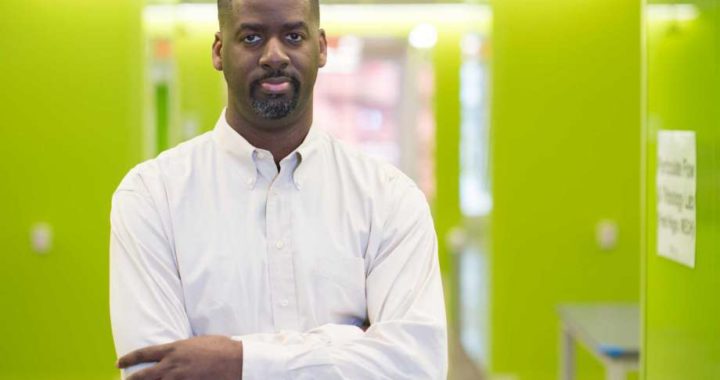Originally posted on HoustonChronicle.com
Teaching engineers to see the big picture
By Kyrie O’Connor
December 13, 2016
C. Fred Higgs III remembers the day, in third grade, that he got an A+ in math.
“It drove me, the way adults reacted,” he says now.
Education was paramount in the Higgs household in Tallahassee, Fla., and both of his parents had advanced degrees.
But Higgs’s father never completed his Ph.D., and C. Fred Higgs Jr. made his three children promise they wouldn’t make the same mistake.
His namesake took that to heart early. He decided to become a scientist.
That stuck until, in sixth grade, Higgs’s Walkman player broke. He took the back off. “I don’t know what I’m going to do now, but I’m going to fake it,” he told himself.
He fiddled with a wire, the Walkman made a sound, and an engineer was born.
Just wanting his father to be proud took him halfway through his doctorate at Rensselaer Polytechnic Institute in New York State. “After that, it was too hard,” Higg says. “You must have your own love for it. That kicked in for me.”
Now Higgs is the newly minted John and Ann Doerr professor of mechanical engineering at Rice University — with a joint appointment in bioengineering — and faculty director of the Rice Center for Engineering Leadership, known as RCEL.
Rice courted Higgs from Carnegie-Mellon University in Pittsburgh, and he arrived in Houston in July.
His field is tribology, the study of interacting surfaces — friction, lubrication and wear. Houston is, he says, Tribology Central.
“You have to know this is the world’s hub,” he says, because the two industries that have to worry most about friction and wear are oil and gas (think drill bits) and medicine (think replacement joints). His office computer shows a simulation of a bit drilling into rock. “In this city, this problem is par for the course,” he says. “This is the place to be.”
Higgs has a gift for making tribology sound fascinating even to a non-engineer.
“I put a lot of energy into contextualizing what I do,” he says of his teaching. “I cut away the confusing parts.”
His department chair, Laura Schaefer, is more emphatic. “The main thing is, lots of times there’s a separation between the intellectual and the interaction with other people,” she says. “Fred covers all the bases with that.”
His philosophy is simple. “The Holy Grail is to make the entire class understand in the minimum amount of time — to learn the most the fastest,” he says.
But one of the major reasons Higgs was recruited to Rice was his reputation for turning students into leaders. That’s something he did at Carnegie-Mellon, but at Rice it is institutionalized.
About 200 engineering students are part of RCEL, where they are taught to consider all the stakeholders involved — shareholders, employees, the company, the community — when sending a product to market.
As an example of how not to do it, Higgs cites a ride-sharing app. “If you sit down and ask drivers ‘Isn’t it a great opportunity?’ they are always not excited,” he says, because the drivers don’t see themselves as well served by the company.
That wouldn’t happen with someone trained at RCEL, he says. “If someone is from RCEL, you know you’ll have comfort with them as a holistic thinker we can trust,” Higgs says. “We want to produce leaders who take care so that flourishing occurs. Then the entire ecosystem flourishes.”
It doesn’t matter whether the students end up in research, industry or entrepreneurship, he says — they will be ethical leaders.
Kaz Karwowski, the executive director of RCEL, thoroughly enjoys working with Higgs. “Every day we meet, we wind up laughing,” he says. “We get things accomplished and we have a good time.”
He says Higgs has a national reputation for creating leaders.
One of Higgs’ ambitions is to open up the RCEL program to more students by making it leaner and less time-consuming while still being effective. “We hope to broaden it so people feel it is not as big a decision,” he says.
Joshua and Jordan Wagner — identical twins — are two of Higgs’ first-year graduate students, helping him to build up his lab. “I noticed the first time I talked to him that he dispels the stereotype of academics living in a bubble, ” says Joshua. “He’s very knowledgeable outside the bubble.”
Jordan, too, appreciates Higgs’ down-to-earth quality. “With him, there’s an equal significance placed on personal skills, leadership and developing as a successful person, not just as an engineer,” he says.
Schaefer says Higgs has “an incredible energy level. I don’t know if he ever gets tired.”
Higgs would beg to differ. He and his wife, Terese, have three children 6 years old and under — including, of course, C. Fred Higgs IV.
Higgs hasn’t placed exactly the same educational expectation on his children as his parents did, but he does expect them to be engaged. “We’re going to expose them to a rich array of opportunities,” he says. “I’m fine as long as they get passionate.”

